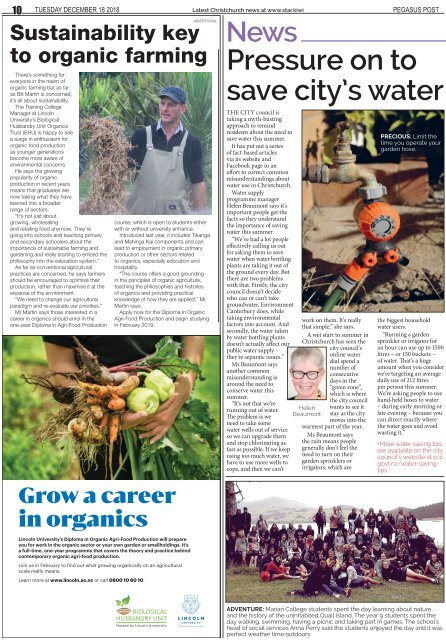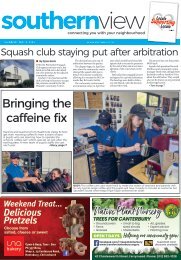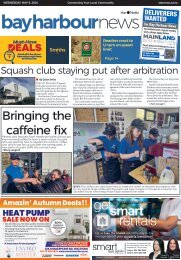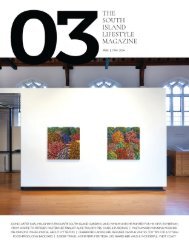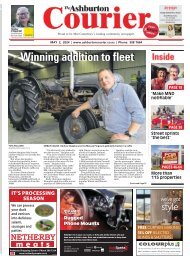You also want an ePaper? Increase the reach of your titles
YUMPU automatically turns print PDFs into web optimized ePapers that Google loves.
10 Tuesday <strong>December</strong> <strong>18</strong> 20<strong>18</strong><br />
Latest Christchurch news at www.star.kiwi<br />
ADverTOrIAL<br />
Sustainability key<br />
to organic farming<br />
There’s something for<br />
everyone in the realm of<br />
organic farming but as far<br />
as Bill Martin is concerned,<br />
it’s all about sustainability.<br />
The Training College<br />
Manager at Lincoln<br />
University’s Biological<br />
Husbandry Unit Organics<br />
Trust (BHU) is happy to see<br />
a surge in enthusiasm for<br />
organic food production<br />
as younger generations<br />
become more aware of<br />
environmental concerns.<br />
He says the growing<br />
popularity of organic<br />
production in recent years<br />
means that graduates are<br />
now taking what they have<br />
learned into a broader<br />
range of sectors.<br />
“It’s not just about<br />
growing, wholesaling<br />
and retailing food anymore. They’re<br />
going into schools and teaching primary<br />
and secondary schoolers about the<br />
importance of sustainable farming and<br />
gardening and really starting to embed the<br />
philosophy into the education system.”<br />
As far as conventional agricultural<br />
practices are concerned, he says farmers<br />
should be encouraged to optimise their<br />
production, rather than maximise it at the<br />
expense of the environment.<br />
“We need to change our agricultural<br />
paradigm and re-evaluate our priorities.”<br />
Mr Martin says those interested in a<br />
career in organics should enrol in the<br />
one-year Diploma in Agri-Food Production<br />
course, which is open to students either<br />
with or without university entrance.<br />
Introduced last year, it includes Tikanga<br />
and Mahinga Kai components and can<br />
lead to employment in organic primary<br />
production or other sectors related<br />
to organics, especially education and<br />
hospitality.<br />
“The course offers a good grounding<br />
in the principles of organic agriculture,<br />
teaching the philosophies and histories<br />
of organics and providing practical<br />
knowledge of how they are applied,” Mr<br />
Martin says.<br />
Apply now for the Diploma in Organic<br />
Agri-Food Production and begin studying<br />
in February 2019.<br />
Grow a career<br />
in organics<br />
Lincoln University’s Diploma in Organic Agri-Food Production will prepare<br />
you for work in the organic sector or your own garden or smallholdings. It’s<br />
a full-time, one-year programme that covers the theory and practice behind<br />
contemporary organic agri-food production.<br />
Join us in February to find out what growing organically on an agricultural<br />
scale really means.<br />
Learn more at www.lincoln.ac.nz or call 0800 10 60 10.<br />
News<br />
Pressure on to<br />
save city’s water<br />
THE CITY council is<br />
taking a myth-busting<br />
approach to remind<br />
residents about the need to<br />
save water this summer.<br />
It has put out a series<br />
of fact-based articles<br />
via its website and<br />
Facebook page in an<br />
effort to correct common<br />
misunderstandings about<br />
water use in Christchurch.<br />
Water supply<br />
programme manager<br />
Helen Beaumont says it’s<br />
important people get the<br />
facts so they understand<br />
the importance of saving<br />
water this summer.<br />
“We’ve had a lot people<br />
effectively calling us out<br />
for asking them to save<br />
water when water bottling<br />
plants are taking it out of<br />
the ground every day. But<br />
there are two problems<br />
with that. Firstly, the city<br />
council doesn’t decide<br />
who can or can’t take<br />
groundwater, Environment<br />
Canterbury does, while<br />
taking environmental<br />
factors into account. And<br />
secondly, the water taken<br />
by water bottling plants<br />
doesn’t actually affect our<br />
public water supply –<br />
they’re separate issues.”<br />
Ms Beaumont says<br />
another common<br />
misunderstanding is<br />
around the need to<br />
conserve water this<br />
summer.<br />
“It’s not that we’re<br />
running out of water.<br />
The problem is we<br />
need to take some<br />
water wells out of service<br />
so we can upgrade them<br />
and stop chlorinating as<br />
fast as possible. If we keep<br />
using too much water, we<br />
have to use more wells to<br />
cope, and then we can’t<br />
work on them. It’s really<br />
that simple,” she says.<br />
A wet start to summer in<br />
Christchurch has seen the<br />
city council’s<br />
online water<br />
dial spend a<br />
number of<br />
consecutive<br />
days in the<br />
“green zone”,<br />
which is where<br />
the city council<br />
wants to see it<br />
stay as the city<br />
moves into the<br />
warmest part of the year.<br />
Ms Beaumont says<br />
the rain means people<br />
generally don’t feel the<br />
need to turn on their<br />
garden sprinklers or<br />
irrigators, which are<br />
Helen<br />
Beaumont<br />
PEGASUS POST<br />
PRECIOUS: Limit the<br />
time you operate your<br />
garden hose.<br />
the biggest household<br />
water users.<br />
“Running a garden<br />
sprinkler or irrigator for<br />
an hour can use up to 1500<br />
litres – or 150 buckets –<br />
of water. That’s a huge<br />
amount when you consider<br />
we’re targeting an average<br />
daily use of 212 litres<br />
per person this summer.<br />
We’re asking people to use<br />
hand-held hoses to water<br />
– during early morning or<br />
late evening – because you<br />
can direct exactly where<br />
the water goes and avoid<br />
wasting it.”<br />
•More water saving tips<br />
are available on the city<br />
council’s website at ccc.<br />
govt.nz/water-savingtips<br />
ADVENTURE: Marian College students spent the day learning about nature<br />
and the history of the uninhabited Quail Island. The year 9 students spent the<br />
day walking, swimming, having a picnic and taking part in games. The school’s<br />
head of social services Anna Perry said the students enjoyed the day and it was<br />
perfect weather time outdoors.


